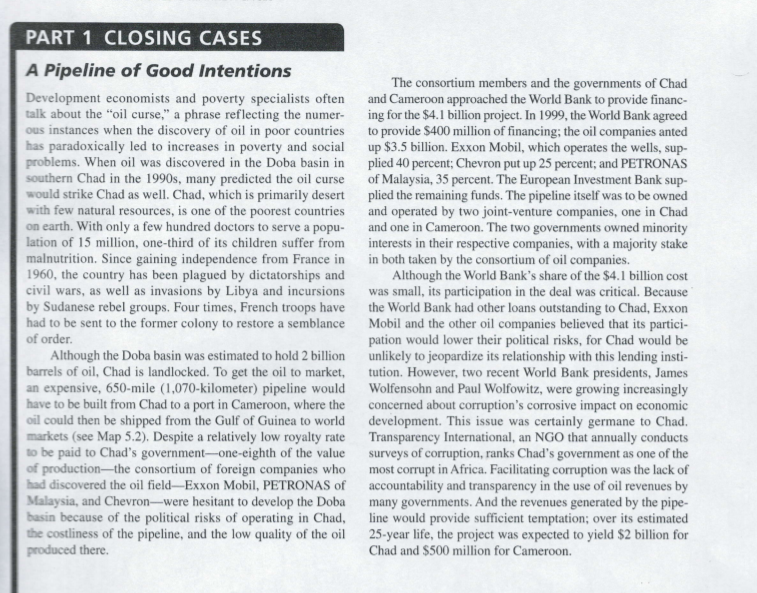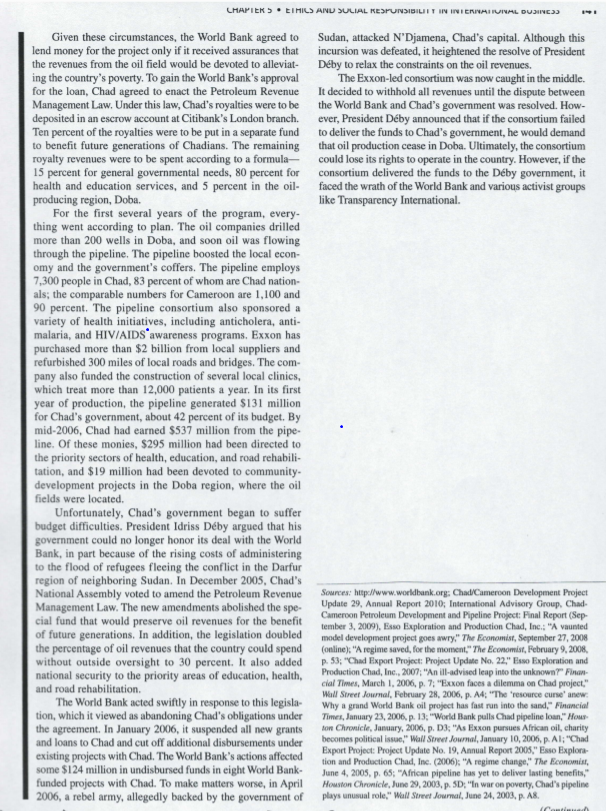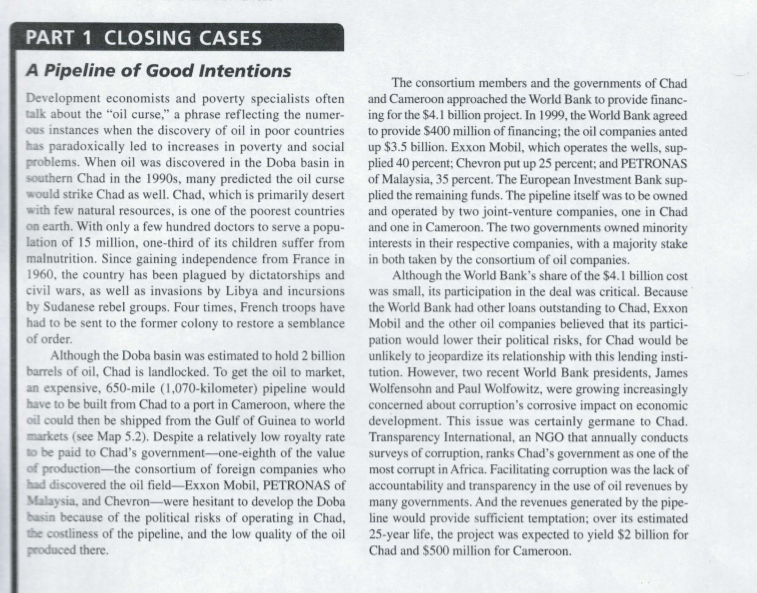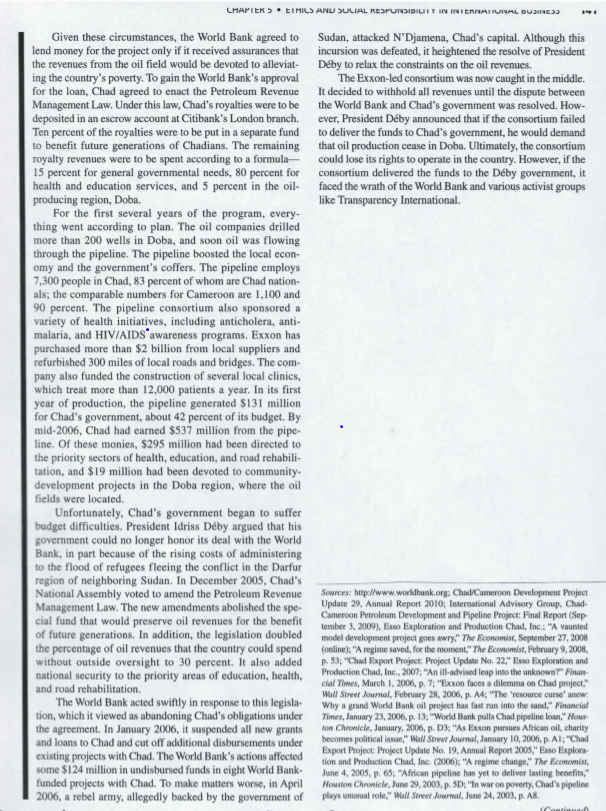

1) Based on this case study what would you consider to be the major problems facing Chad as far as steering towards growth and development is concerned and how do they impact the business environment? What could be done to address the problems?
2) The World Bank classifies Chad as low income; the UNDP see Chad as a country with low human development; the World Economic Forum's ranking of Chad puts it in a non-competitive category; the Heritage Foundation on the other had sees Chad as a mostly unfree country. Based on insights from this case study, would you agree or disagree with these classification/labeling of Chad? Explain your answer
PART 1 CLOSING CASES A Pipeline of Good Intentions The consortium members and the governments of Chad Development economists and poverty specialists often and Cameroon approached the World Bank to provide finance talk about the "oil curse," a phrase reflecting the numer- ing for the $4.1 billion project. In 1999, the World Bank agreed ous instances when the discovery of oil in poor countries to provide $400 million of financing; the oil companies anted has paradoxically led to increases in poverty and social up $3.5 billion. Exxon Mobil, which operates the wells, sup- problems. When oil was discovered in the Doba basin in plied 40 percent; Chevron put up 25 percent; and PETRONAS southern Chad in the 1990s, many predicted the oil curse of Malaysia, 35 percent. The European Investment Bank sup- would strike Chad as well. Chad, which is primarily desert plied the remaining funds. The pipeline itself was to be owned with few natural resources, is one of the poorest countries and operated by two joint-venture companies, one in Chad on earth. With only a few hundred doctors to serve a popu- and one in Cameroon. The two governments owned minority lation of 15 million, one-third of its children suffer from interests in their respective companies, with a majority stake malnutrition. Since gaining independence from France in in both taken by the consortium of oil companies. 1960, the country has been plagued by dictatorships and Although the World Bank's share of the $4.1 billion cost civil wars, as well as invasions by Libya and incursions was small, its participation in the deal was critical. Because by Sudanese rebel groups. Four times, French troops have the World Bank had other loans outstanding to Chad, Exxon had to be sent to the former colony to restore a semblance Mobil and the other oil companies believed that its partici- of order. pation would lower their political risks, for Chad would be Although the Doba basin was estimated to hold 2 billion unlikely to jeopardize its relationship with this lending insti- barrels of oil, Chad is landlocked. To get the oil to market, tution. However, two recent World Bank presidents, James an expensive, 650-mile (1,070-kilometer) pipeline would Wolfensohn and Paul Wolfowitz, were growing increasingly have to be built from Chad to a port in Cameroon, where the concerned about corruption's corrosive impact on economic oil could then be shipped from the Gulf of Guinea to world development. This issue was certainly germane to Chad. markets (see Map 5.2). Despite a relatively low royalty rate Transparency International, an NGO that annually conducts to be paid to Chad's government-one-eighth of the value surveys of corruption, ranks Chad's government as one of the of production-the consortium of foreign companies who most corrupt in Africa. Facilitating corruption was the lack of had discovered the oil field-Exxon Mobil, PETRONAS of accountability and transparency in the use of oil revenues by Malaysia, and Chevron-were hesitant to develop the Doba many governments. And the revenues generated by the pipe- basin because of the political risks of operating in Chad, line would provide sufficient temptation; over its estimated the costliness of the pipeline, and the low quality of the oil 25-year life, the project was expected to yield $2 billion for produced there. Chad and $500 million for Cameroon.LHAPIEN S . ETHICS AND SULIAL RESPONSIBILITY IN INTERNATIONAL DUNINESS Given these circumstances, the World Bank agreed to Sudan, attacked N'Djamena, Chad's capital. Although this end money for the project only if it received assurances that incursion was defeated, it heightened the resolve of President the revenues from the oil field would be devoted to alleviat Deby to relax the constraints on the oil revenues. ing the country's poverty. To gain the World Bank's approval The Exxon-led consortium was now caught in the middle. for the loan, Chad agreed to enact the Petroleum Revenue It decided to withhold all revenues until the dispute between Management Law, Under this law, Chad's royalties were to be the World Bank and Chad's government was resolved. How- deposited in an escrow account at Citibank's London branch. ever, President Deby announced that if the consortium failed Ten percent of the royalties were to be put in a separate fund to deliver the funds to Chad's government, he would demand to benefit future generations of Chadians. The remaining that oil production cease in Doba. Ultimately, the consortium royalty revenues were to be spent according to a formula- could lose its rights to operate in the country. However, if the 15 percent for general governmental needs, 80 percent for consortium delivered the funds to the Deby government, it health and education services, and 5 percent in the oil- faced the wrath of the World Bank and various activist groups producing region, Doba. like Transparency International. For the first several years of the program, every- thing went according to plan. The oil companies drilled more than 200 wells in Doba, and soon oil was flowing through the pipeline. The pipeline boosted the local econ- omy and the government's coffers. The pipeline employs 7,300 people in Chad, 83 percent of whom are Chad nation- als; the comparable numbers for Cameroon are 1,100 and 90 percent. The pipeline consortium also sponsored a variety of health initiatives, including anticholera, anti- malaria, and HIV/AIDS awareness programs. Exxon has purchased more than $2 billion from local suppliers and refurbished 300 miles of local roads and bridges. The com- pany also funded the construction of several local clinics, which treat more than 12,000 patients a year. In its first year of production, the pipeline generated $131 million for Chad's government, about 42 percent of its budget. By mid-2006, Chad had earned $537 million from the pipe- line. Of these monies, $295 million had been directed to the priority sectors of health, education, and road rehabili- tation, and $19 million had been devoted to community- development projects in the Doba region, where the oil fields were located. Unfortunately, Chad's government began to suffer budget difficulties. President Idriss Deby argued that his government could no longer honor its deal with the World Bank, in part because of the rising costs of administering to the flood of refugees fleeing the conflict in the Darfur region of neighboring Sudan. In December 2005, Chad's National Assembly voted to amend the Petroleum Revenue Sources: http:/www.worldbank.org: Chad/Cameroon Development Project Management Law. The new amendments abolished the spe- Update 29, Annual Report 2010; International Advisory Group, Chad- cial fund that would preserve oil revenues for the benefit Cameroon Petroleum Development and Pipeline Project: Final Report (Sep- tember 3, 2009), Esso Exploration and Production Chad, Inc.; "A vaunted of future generations, In addition, the legislation doubled model development project goes awry," The Economist, September 27, 2008 the percentage of oil revenues that the country could spend (online): "A regime saved, for the moment," The Economist, February 9, 2008, without outside oversight to 30 percent. It also added p. 53: "Chad Export Project: Project Update No. 22," Esso Exploration and national security to the priority areas of education, health, Production Chad, Inc., 2007; "An ill-advised leap into the unknown ?" Finan and road rehabilitation. cial Times, March 1. 2006, p. 7; "Exxon faces a dilemma on Chad project," The World Bank acted swiftly in response to this legisla- Wall Street Journal, February 28, 2006, p. A4: "The "resource curse' anew Why a grand World Bank oil project has fast run into the sand," Financial tion, which it viewed as abandoning Chad's obligations under Times, January 23, 2006. p. 13; "World Bank pulls Chad pipeline loan," Hour- the agreement. In January 2006, it suspended all new grants ton Chronicle, January, 2006, p. DJ; "As Exxon pursues African oil, charity and loans to Chad and cut off additional disbursements under becomes political issue," Wall Street Journal, January 10, 2006, p. Al; "Chad existing projects with Chad. The World Bank's actions affected Export Project: Project Update No. 19, Annual Report 2005," Esso Explora- tion and Production Chad, Inc. (2006); "A regime change," The Economist, some $124 million in undisbursed funds in eight World Bank- June 4, 2005, p. 65; "African pipeline has yet to deliver lasting benefits," funded projects with Chad. To make matters worse, in April Houston Chronicle, June 29, 2003, p. 3D: "In war on poverty, Chad's pipeline 2006, a rebel army, allegedly backed by the government of plays unusual role," Wall Street Journal, June 24, 2003, p. AS










